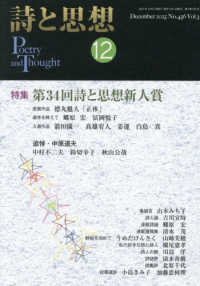- ホーム
- > 洋書
- > 英文書
- > Politics / International Relations
Full Description
The importance of subnational regions to politics, governance, and economic development in Western Europe has long been recognized. However, far less is known about recent steps to introduce a regional level of politics in East Central Europe. Reforms there are part of the larger process of crafting democracy; that is, regional reforms are linked to the economic and political transition away from communism and toward "Europe," specifically the European Union.
Crafting Democracy offers an important comparative analysis of the process and outcomes of region-building in the four Visegrád countries. Jennifer A. Yoder investigates why some but not other post-communist countries chose to introduce a regional level of elected government. In the 1990s, for example, Poland boldly took the lead in regionalization, while the Czech Republic and Slovakia lagged behind. Hungary, meanwhile, declined to create regions. The author argues that these regional reform processes have potentially far-reaching implications for state-society relations, political participation, and policymaking at the domestic level. The emergence of new actors at the subnational level, moreover, creates opportunities for cross-border and European Union-level initiatives.
Contents
Introduction
Chapter 1: A Framework for Understanding Region Building in Post-communist Europe
Chapter 2: Poland: The Leader of the Pack
Chapter 3: The Czech Republic: Reluctant Regionalization
Chapter 4: Slovakia: Belated and Incomplete Regionalization
Chapter 5: Hungary: The Exceptional Case?
Conclusion
Appendix A: Snapshots of Regionalization in Western Europe
Appendix B:The ECE Regions in the EU
Appendix C: Voter Turnout for Regional and National Elections
Appendix D: Election Outcomes by Region and Year
Bibliography







